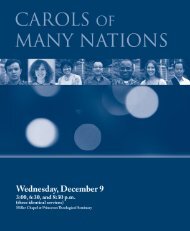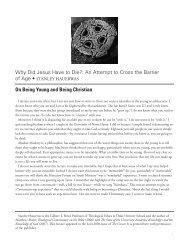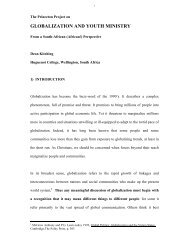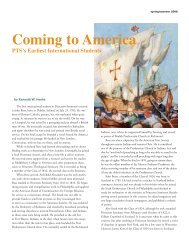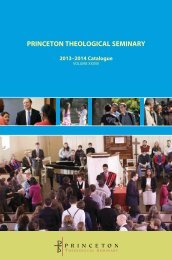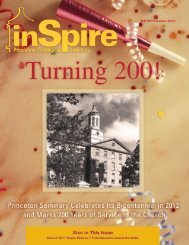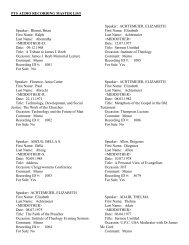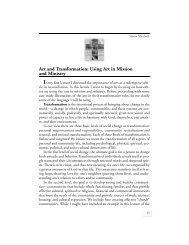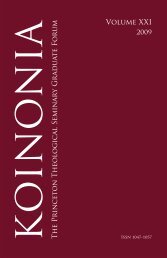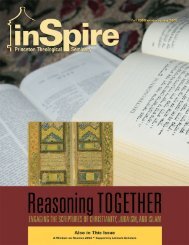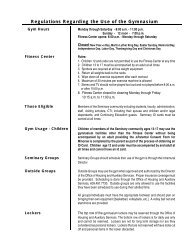P E R S P E C T I VAS - Princeton Theological Seminary
P E R S P E C T I VAS - Princeton Theological Seminary
P E R S P E C T I VAS - Princeton Theological Seminary
You also want an ePaper? Increase the reach of your titles
YUMPU automatically turns print PDFs into web optimized ePapers that Google loves.
Perspectivas/Occasional Papers • Fall 2006Perspectivas/Occasional Papers • Fall 2006there are many others who serve us not only in the many finerestaurants and hotels of cities like San Antonio and Austin butt h roughout the country. This past summer while visitingManhattan, I met two similar waiters who shared their story withme while serving me at upscale restaurants in Central Park.In order to begin to answer the question of how the churchembodies the doctrine of the imago Dei in the Southwest, I felt itnecessary to give you this panoramic view of an immigrant realitythat we as a theological community and church find difficult todismiss and that we attempt to address in the preparation and formationof our clergy. We encourage our students to read the cityas a text for theological study and critical reflection. We accompanythem to develop critical thinking skills to help them ask thedifficult doctrinal questions that arise from living in our particularcontext, e.g.:• What does it mean to be created in the image and likeness ofGod in the context of the Southwest where immigrants andmany native folk are often not seen at all, even as they constructour roads, build our homes, serve us in restaurants,and live close enough to be our neighbors?• What does it mean to be a seminary in mission in this contextso that all people regardless of ethnic heritage, immigrantstatus, or native language are valued and esteemed as childrenof God?• What does it mean for the church to embody a doctrine thataffirms the life-creating and life-affirming nature of theCreator who from the very genesis of the creation narrativecalls it “very good” (Genesis 1:31)?These and other questions naturally arise from reading the biblicaltext of the imago Dei (Genesis 1:26) within our context of missionand ministry.Perspectives on the Doctrine of the Imago DeiAllow me to offer some potential insights to these questionsthat might shed light on how the church might respond to theinvisible community and to those folks who are seeking answersto these and other questions. There have been many and diverseinterpretations of the imago Dei throughout history, but mostscholars today generally agree that the imago Dei refers to the profoundvalue and sanctity of human life as well as the potential forrelationship with the Creator. Claus Westermann indicates that tobe created in the image and likeness of God does not mean a particularhuman quality (such as reason which was especially exaltedduring the Enlightenment). Rather, it concerns the purpose of relationshipand responsibility for the creation. He observes that theCreator creates a being analogous to the Creator, to whom theCreator can speak, and who will listen and speak to the Creator.This purpose “remains true despite all human differences; everyperson is created in the image of God.” 2 Further, humanity isgiven a special task and is gifted with human dignity, a value ofhigh esteem and respect that is intrinsic to human being. Thisvalue was of particular interest for the early church.For Philip Hefner, the human being is created in the image ofGod as a created co-creator with a high destiny. This destiny isessential to the world if the human is to bear the mark of theCreator. For Hefner, the ability to make self-aware, self-criticaldecisions, to act on those decisions, as well as to take responsibilityfor them are characteristics that comprise the image of God inhumanity. This includes the freedom to conceive of actions and tocarry them out, a freedom that is grounded and finds meaning ina relationship with God. The ability to reflect on this freedom andactions is what allows the human agent as a created co-creator to beresponsible for the creation and to discover one’s likeness to Godand one’s origin and destiny in God. 36869



